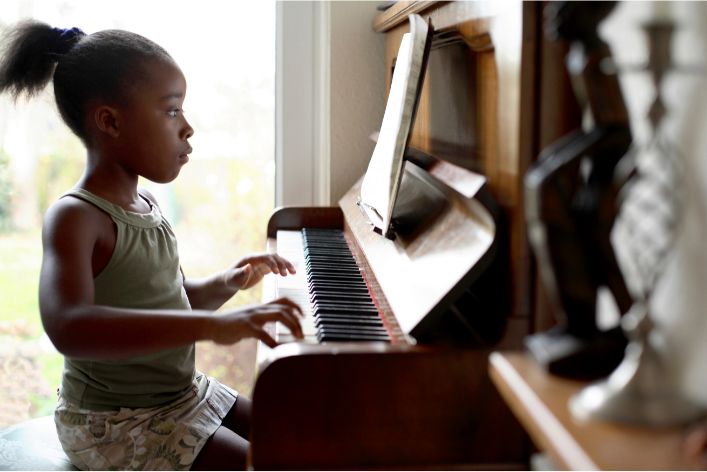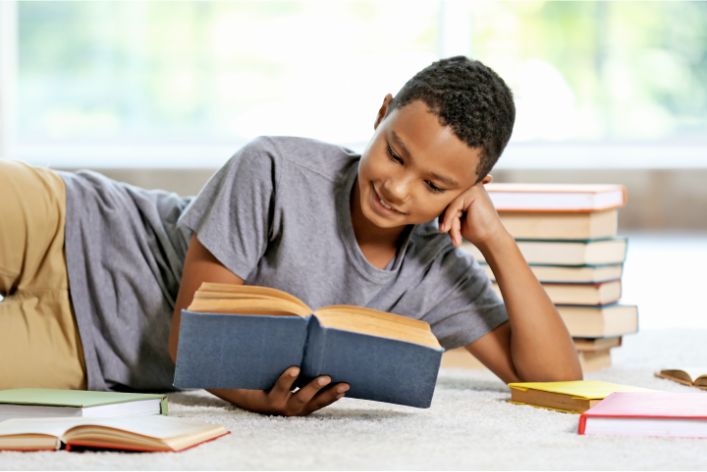Introduction
Music education is crucial for children, as it promotes cognitive, social and emotional development. Children who take music lessons are likely to perform better academically, have better memory, and improve their social skills.
In Nigeria, there is a growing demand for music lessons for children. Parents are realizing the benefits of music education and are enrolling their children in music lessons.
Music lessons for kids in Nigeria are becoming more accessible with the rise of music schools and private music tutors. These lessons can cover a variety of instruments including drums, guitar, piano, and violin. Parents can choose to enroll their children in group classes or one-on-one lessons.
Music education can ignite a child’s creativity and passion towards music. It is a great way for children to learn discipline, perseverance, and self-expression. Research shows that children who learn an instrument are more likely to have a positive attitude towards school and education.
Additionally, music education can create opportunities for children to participate in performances and competitions, which can boost their confidence and self-esteem. It can also foster a sense of community and shared experiences among the students.
Music education is essential for children’s development, and the demand for music lessons in Nigeria is on the rise.
Parents should consider enrolling their children in music lessons to give them the advantage of cognitive, social and emotional development. Music education can shape a child’s future with creativity, discipline and self-expression.
Read: Cultural Impacts on Parenting Practices in Nigeria
Factors to Consider When Choosing a Music Lesson for Kids
When it comes to choosing music lessons for kids, there are several factors that parents need to consider. Here are some of the most important:
Age Appropriateness of Lessons
The first and most important factor to consider is the age of your child. You want to make sure that the lessons are age-appropriate and that your child will be able to understand and enjoy them.
Some music schools offer programs specifically designed for young children, while others may be better suited for older kids.
Availability of Qualified Music Teachers
You want to make sure that your child is learning from a qualified music teacher who is experienced in working with kids. Don’t be afraid to ask about the qualifications and experience of the teachers at the school you are considering.
Cost of Lessons
Music lessons can vary in price, so it’s important to consider your budget when choosing a school. Keep in mind that the cheapest option may not always be the best one, so be sure to weigh the cost against the quality of the lessons and the qualifications of the teachers.
Accessibility and Location Considerations
Is the music school located in a convenient location for you and your child? Consider factors such as travel time and transportation costs when choosing a school. You may also want to consider if the school offers online lessons, which can save you time and money.
Range of Instruments Offered
Some music schools may specialize in certain instruments, such as piano or guitar, while others may offer a wide range of instruments to choose from. Consider your child’s interests and abilities when choosing a school.
Parenting Made Just for You
Get personalized Parenting Solutions tailored to your child’s needs. Transform your parenting journey with expert guidance in 1-3 days.
Get StartedLesson Duration and Frequency
The duration and frequency of lessons can vary from school to school. Some schools may offer shorter lessons more frequently, while others may offer longer lessons once a week. Consider your child’s schedule and attention span when deciding what type of lessons would be best.
Ultimately, choosing the right music lessons for your child requires careful consideration of all these factors. Be sure to do your research, visit potential schools, and talk to other parents and students to get a better sense of what each school has to offer.
Read: Creative Art and Craft Ideas for Nigerian Parents
Benefits of Music Education for Kids
As a parent, you may be considering enrolling your child in music lessons.
Apart from the potential to make them the next superstar, there are many other benefits to music education.
Here are some notable advantages:
Development of Cognitive Abilities
- Music education is said to help develop cognitive abilities in children
- Studies have shown that playing an instrument can improve critical thinking and problem-solving skills
- Learning music also helps children with memory retention and enhances their spatial reasoning abilities
Improved Emotional Intelligence
- Music education can help children express their emotions and facilitate healthy emotional growth
- It provides an outlet for creative expression and helps in the development of emotional intelligence
- Through music, children can learn to identify and regulate their emotions, which is essential in promoting positive mental health
Social and Cultural Exposure
- Music education offers children the opportunity to interact with other children and adults who share their passion for music
- It exposes them to different cultures and traditions and helps to promote diversity and multiculturalism
- As they learn about new genres of music, children can learn to appreciate different art forms and broaden their understanding of the world around them
Boost in Creativity and Confidence
- Music education fosters creativity and encourages children to think outside the box
- Through practice and performance, children become more confident in their abilities
- Learning to play an instrument or sing in public can help children develop stage presence, improve communication skills, and boost their self-esteem
In short, music education can be incredibly beneficial for children. It improves cognitive abilities, emotional intelligence, offers social and cultural exposure, and boosts creativity and confidence.
Read: Unforgettable Family Road Trips Around Nigeria

Popular Music Lessons for Kids in Nigeria
Music is an integral part of Nigerian culture, and introducing your child to music lessons can be a great way to enhance their education. There are several popular music lessons for kids in Nigeria, and in this guide, we will explore some of the most popular options.
Piano
One of the most commonly taught instruments in Nigeria is the piano. Piano lessons offer a great foundation for any child interested in music as they teach basics on music theory and reading music sheets.
The piano is an excellent instrument to learn for young children because it teaches them about rhythm, melody, and harmony.
Also, it is an instrument that is relatively easy to learn. As such, it is not a surprising sight to see many Nigerian households with a piano.
Guitar
The guitar is another popular instrument for kids in Nigeria to learn. Like the piano, the guitar is an instrument with a gentle learning curve.
There are various types of guitars, such as the acoustic and the electric guitar, which children can learn.
Unveil the Perfect Name that Tells Your Family's Story
Let us help you find a name that embodies your family's values, traditions, and dreams. Our personalized consultation weaves cultural insights to create a name that's uniquely yours.
Get StartedMusic schools typically teach students the basics of reading musical notes in combination with practical lessons. Guitar lessons also teach children about chords and scale, which helps with coordination and builds finger strength.
Drums
Drums are another popular instrument for kids in Nigeria, and the lessons are often very lively and engaging.
Drumming is a skill that can help children to deal with stress; the beats produced by drumming can create a soothing sensation for children.
Drumming also helps in the development of motor skills as it helps with muscle coordination with both hands and feet.
Children that learn drums have a chance to join musical bands or even learn how to create songs by themselves.
Violin
Violin lessons in Nigeria are also becoming increasingly popular for children, as the instrument is relatively easy to learn, and it can be played both as a solo or in a band.
Playing violin improves children’s overall emotional state and develops neurological pathways, which helps in cognitive development.
Although it is not the easiest of instruments to play, violin playing can help your child to learn patience, dedication and develop coordination skills.
Saxophone
The Saxophone is another instrument available for music lessons in Nigeria; it is an instrument used to play a range of styles that inclines more towards the jazz, blues, rock and classical genres of music.
It is a versatile and dynamic instrument that teaches its player techniques that they can apply to other wind instruments.
Saxophone lessons also help children develop coordination skills, breath control, and posture; playing the Saxophone is perfect for children who love to stand out and take the lead.
Essentially, music lessons for children in Nigeria come in different taste -kids can make choices among piano, guitar, drums, violin, and saxophone.
These lessons help children to learn discipline, coordination, patience, endurance and other life skills that can build their overall personality.
Parents should encourage their children to learn music as it can be incredibly rewarding and plays an essential role in the overall development of a child.
Music is a great way to expose children to their cultural heritage. Also, it opens up opportunities for them to explore different areas in their lives, and possibly have a career in music!
Read: Cooking Nigerian Dishes with Kids: Fun & Learning
Tips for Preparing Kids for Music Lessons
When it comes to music lessons, it is important to prepare your kids properly to help them get the most out of their learning experience. Here are some tips to help:
Encouraging Regular Practice
- Set aside a specific time and place each day for practice
- Make practicing fun by incorporating games or challenges
- Encourage your child to practice songs they enjoy
Creating a Conducive Learning Environment
- Choose a quiet room free from distractions
- Ensure proper lighting and ventilation
- Have comfortable seating and a sturdy music stand
Providing Appropriate Instruments and Accessories
- Invest in a high-quality instrument that fits your child’s size and skill level
- Provide all necessary accessories, such as extra strings or reeds
- Ensure the instrument is properly maintained and in good working condition
Offering Encouragement and Support
- Celebrate your child’s progress, no matter how small
- Show interest in their practice and ask about their lessons
- Attend their performances and recitals to show your support
By following these tips, you can set your child up for success in their music lessons and help them develop a lifelong love for music.
Read: Hosting Parties for Nigerian-Themed Children: A How-to
Conclusion
Music lessons can have a tremendously positive impact on a child’s development, providing cognitive, emotional, and social benefits.
Parents in Nigeria should consider investing in music education for their children, as there are a variety of reputable music programs available throughout the country.
By enrolling children in music lessons, parents can encourage their development in a number of areas, including language, memory, creativity, and social skills.
Moreover, music can offer children an outlet for self-expression and a means of reducing stress.
In a nutshell, while it can be difficult to fit music lessons into busy schedules and budgets, the rewards of doing so can be substantial.
Whether through private lessons or group programs, investing in children’s music education is an investment in their future success and well-being.




